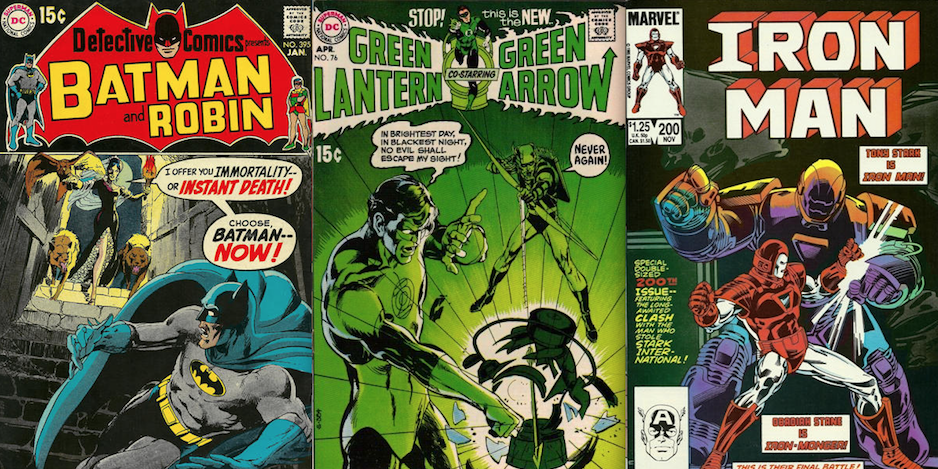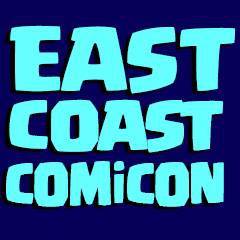One of comics’ greatest writers will be joining us for an interview — and you can help.—
Cliff Galbraith’s East Coast Comicon at the Meadowlands Exposition Center in Secaucus, N.J., is on April 29 and 30, and I’ll be there — and so will dozens of your favorite comics creators, like Marv Wolfman, Jose Luis Garcia-Lopez and Kevin Maguire, and retro TV stars like the cast from Lost in Space. (For the full line-up, click here.)
On Saturday at 3:30, I’ll be hosting a panel with Denny O’Neil, one of comics’ greatest storytellers, a writer and editor whose career spanned decades with DC, Marvel and Charlton. His Green Lantern/Green Arrow run with artist Neal Adams brought social relevance to mainstream comics and his work with Adams on Batman helped reinvent the character for the modern era with the creation of Ra’s al Ghul and the return of the Joker to his homicidal roots. And I haven’t even mentioned his work on The Question, Iron Man, Daredevil, etc.

Wanna ask him a question? Well, enter it in the comments below. I’ll collect the best and ask them during the panel. (And yes, you can still submit questions if you live too far from the show. I plan on posting the best answers at 13th Dimension sometime down the line.)
And whether you have a question or not, come say hi at the show and come meet Denny O’Neil. Click here for ticket info.
One last thing to note: Panel schedules are subject to change so plan accordingly.


April 25, 2017
How did you get in the comic book industry?
– From Timothy Weber
April 25, 2017
What do you think about Aquaman?
You basically ignored him when you wrote JLA. Was that on purpose, or do you dislike the character?
April 25, 2017
Here’s a question for Mr. O’Neil: As someone who’s seen — and even presided over — so many iterations of Batman over the last five decades, what are your thoughts on the emphasis both fans and artists alike place on “canon” nowadays? All long-running mythologies are subject to periodic reset, in order to reinvent themselves and remain creatively vibrant, but it seems these days — with all the lineup-wide revamps initiated every few years — a lot of effort is put into making sure that nothing is ever outright abolished, necessarily, merely reassigned to an “alternate reality,” and those retconned events may be incorporated into the new continuity in part or whole, or altogether ignored, at the storyteller’s discretion. That’s often the consolation prize for a continuity reboot: It still happened… it just happened elsewhere. But is in-universe justification for every creative/editorial decision creating a more consistent “shared universe” at the expense of effective storytelling itself? And to what end?
When I was first reading comics in the late eighties, there was a baseline continuity maintained between Jim Starlin’s scripts for Batman and Alan Grant’s for Detective from month to month (when Jason Todd died in the former, he stopped appearing in the latter), but there wasn’t this obsessive significance placed on “canonicity” that we have now, which makes stories all about scorecard-keeping and Easter egg–hunting. Stories used to help us make sense of reality; now making sense of the fiction itself seems to be the entire purpose of narrative. Are comics better off for this? Would Nolan’s brilliant Dark Knight trilogy have been better served for having existed as part of a “shared cinematic universe” with Superman and Wonder Woman, et al., or did it reach unprecedented heights of artistic and mythological grandeur because it was allowed to be its own self-contained interpretation of Batman, free of the shackles of some larger mythology or continuity? Folkloric characters are valuable precisely because of their versatility — different artists can reinterpret them to fit the changing times — yet this premium we place on continuity/canonicity, on creative uniformity, seems to be stripping them of their most valuable cultural asset. If we deprioritized the need, the obsessive search, for patterns and correlations — a.k.a. continuity — in our fictional “universes,” wouldn’t our fixation with what constitutes canon, a meaningless designation if ever there was one, then itself seem equally pointless?
April 25, 2017
Here’s another question for Mr. O’Neil: With all due respect to the invaluable creative contributions of Bill Finger to the development of Batman, was it really DC’s place to posthumously award him co-creatorship attribution over 75 years after the fact? Bob Kane had a contract with DC, and Finger an arrangement with Kane, and I don’t see justification for DC to renegotiate that deal in absentia, if for no other reason than the two men who entered into it never themselves sought to redefine its terms in their lifetimes: Kane never saw fit to grant Finger a byline despite having expressed explicit reservations about their lopsided arrangement later in life, and Finger never publicly or privately petitioned for official co-creatorship acknowledgement to anyone’s awareness, per his biographer and advocate — and authority on this matter — Marc Tyler Nobleman. Don’t we diminish the institution of authorship — and disrespect the explicit wishes of both men — by granting Finger shared credit because it “feels” like he deserved it?
April 26, 2017
What did you think of Frank Robbins’ stories on Batman? He was writing him the same time you did many of your well known stories on the character.